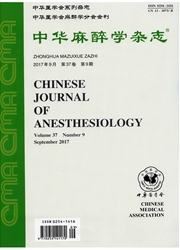

 中文摘要:
中文摘要:
目的评价反应熵和状态熵监测全麻患者镇静水平的准确性。方法择期行腹部手术患者20例,ASAⅠ或Ⅱ级,人室后监测反应熵(RE)、状态熵(SE)及脑电双频谱指数(BIS),静脉注射异丙酚、维库溴铵和芬太尼麻醉诱导,气管插管后机械通气,吸人七氟烷、间断静脉注射维库溴铵和芬太尼维持麻醉。分别于入室时、意识消失前10min、意识消失即刻、气管插管时、手术1h、意识恢复前10min、意识恢复即刻、拔管后10min时记录RE、SE和BIS。结果RE、SE和BIS在意识改变前后差异均有统计学意义(P〈0.05),RE、SE和BIS判断意识消失的临界值分别为76、73和68,灵敏度分别为94%、95%和92%,特异度分别为92%、94%和91%,临界值判断意识消失的准确度分别为93%、95%、94%;判断意识恢复的临界值分别为82、75和70,灵敏度分别为95%、95%和91%,特异度分别为93%、96%和93%,临界值判断意识恢复的准确度分别为98%、96%和97%。结论熵指数能够准确地监测全麻患者镇静水平。
 英文摘要:
英文摘要:
Objective To evaluate the accuracy of spectral entropy including response entropy (RE) and state entropy (SE) as a new electroencephalographic measure of depth of sedation during general anesthesia. Methods Twenty ASA Ⅰ or Ⅱ patients aged 20-55 yr undergoing elective abdominal surgery were studied. Anesthesia was induced with intravenous propofol, fentanyl and vecuronium. After tracheal intubation anesthesia was maintained with sevoflurane inhalation and intermittent iv boluses of fentanyl and veeuronium. BP, HR, SpO2, spectral entropy (Datex-Ohmeda) and BIS (Aspect Medical) were monitored during anesthesia. Loss of eyelash reflex and unresponsiveness to verbal stimulus and mild prodding and shaking were considered to be signs of loss of consciousness (LOC). The time of regaining consciousness was defined as the time when patients started responding to verbal commands. RE, SE and BIS were recorded before anesthesia ( baseline), 10 rain before LOC, immediately after LOC, immediately after tracheal intubation, 1 h after skin incision, 10 min before regaining consciousness immediately after consciousness was regained and 10 min after extubation. Results There were significant changes in RE, SE and BIS during the transition from consciousness to LOC. The RE, SE and BIS values for LOC were 76, 73 and 68 with sensitivity of 94%, 95% and 92% and specificity of 92%, 94% and 91% respectively. The accuracy of RE, SE and BIS in predicting LOC was 93%, 95% and 94% respectively. The RE, SE and BIS values for regaining consciousness were 82, 75 and 70 with sensitivity of 95 %, 95 % and 91% and specificity of 93%, 96% and 93% respectively. The accuracy in predicting regaining of consciousness was 98 %, 96 % and 97 % respectively. Conclusion Entropy index can accurately monitor level of sedation during general anesthesia.
 同期刊论文项目
同期刊论文项目
 同项目期刊论文
同项目期刊论文
 期刊信息
期刊信息
